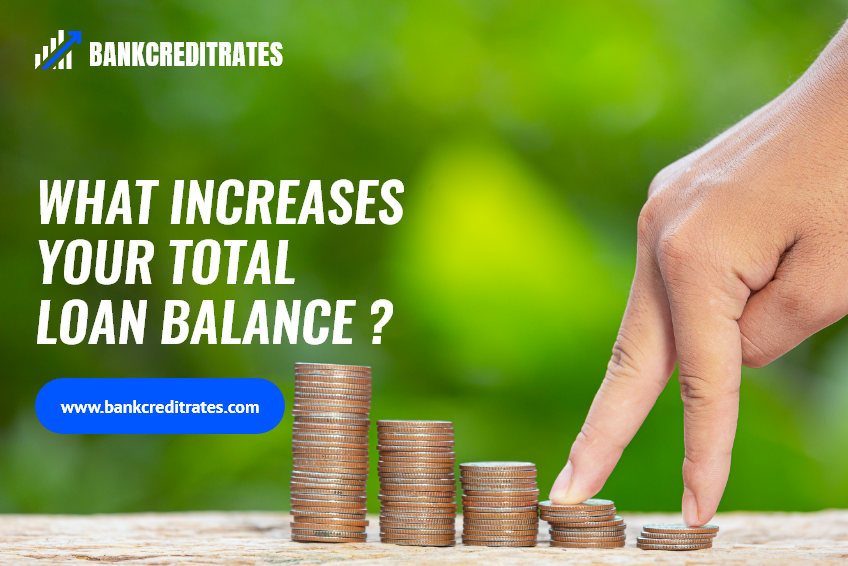Guides
What Increases Your Total Loan Balance: 10+ Key Factors and Strategies

bankcreditrates.com
At BankCreditRates, our mission is to assist you in making informed financial choices. We are committed to upholding rigorous editorial standards. Please note that this article may make mention of financial products offered by our trusted partners.
It is important to understand the repayment terms when considering taking a loan. There are details about principal and interest, which need to be paid over the specified time.
By doing this you can manage your loan efficiently. SOmetimes what happens is that the total loan balance increases during the repayment process.
This may be unexpected to the borrower because there are some factors that increase the balance increase. In this article, we are going to understand what increases your total loan balance.
Contents
Factors that Increase Your Total Loan Balance:
Penalties and Fees
Loan balances can increase due to various fees and penalties, including late fees, payment processing fees, account maintenance fees, and application charges.
Late fees, in particular, are common and can be expensive. When borrowers miss a payment deadline and incur a late fee, creditors often add it to the next month’s statement, and additional interest may accrue as a result of the penalty.
Variable Interest:
Variable interest rates, also known as adjustable rates, can fluctuate based on market changes. For instance, with an adjustable-rate mortgage (ARM), borrowers making minimum payments on a payment-option loan or with a payment cap may see their total balance rise.
A payment cap means having a fixed monthly payment. If interest rates increase and the fixed payment doesn’t cover the higher costs, the unpaid interest may be added to the principal balance, causing the total balance to grow.
Payment-option loans, which allow borrowers to choose different payment options each month, can also contribute to an increase in the total balance if minimum payments do not cover the full interest cost.
Capitalized Interest Rates:
Interest capitalization happens when unpaid interest gets added to the principal balance of a loan. Normally, interest is included in the monthly payment.
However, there are situations where interest may go unpaid and continue to accumulate. For example, loan deferment or forbearance, often associated with student loans, can lead to interest capitalization.
In these cases, lenders may add the unpaid interest to the loan principal, resulting in an increase in the borrower’s total balance and monthly payment, as well as the total interest paid.
Minimum Payments:
Making a payment that falls short of the minimum amount owed can have adverse effects on a borrower’s remaining balance and credit scores, especially for installment loans.
Lenders typically consider payments less than the minimum amount as missed payments, impacting the borrower’s payment history and lowering their credit scores. Additionally, the lender may add any unpaid principal, penalties, or interest charges to the outstanding balance, causing an increase in the total amount owed.
How to You Can Decrease Your Total Loan Balance Quickly:
Now that we’ve covered the factors that can raise your loan balance, let’s explore how to reduce it efficiently:
- Additional payments are an effective way to reduce your loan balance and lower the interest you pay on the loan.
- Contributing extra money each month helps speed up debt repayment and saves on interest costs.
- Some lenders offer discounts for setting up automated payments on loans, making it easier and potentially cheaper.
- Certain situations, like student loans, may lead to partial or complete loan forgiveness, reducing the amount you have to repay.
- If none of these options work, consider loan refinancing to find better interest rates and repayment terms.
- Refinancing allows you to replace your current loan with a new one, but remember that terms depend on your credit and payment history.
- Improving your credit can be a smart move before seeking refinancing.
What do you understand about what increases your total loan balances?
Understanding factors that increase your loan balance is essential for financial management. Penalties, such as late fees and processing charges, can add to the total. Variable interest rates, especially with payment caps or payment-option loans, may lead to balance growth.
Interest capitalization during loan deferment or forbearance can also result in a higher total balance. Making payments below the minimum can negatively impact your credit, as unpaid charges get added to the outstanding balance.
To reduce your loan balance swiftly, consider extra payments, automated payment discounts, potential loan forgiveness, or refinancing for better terms based on credit and payment history. Prioritize understanding these factors for effective financial planning.
Conclusion:
In short there are different factors that makes your total loan balances increased. Interest on loans should be paid quikly. Even if you fall behind there are many ways to get you back on track. You just need to understand how interest works and what increases your total loan balances. So that you can create plan to keep the repayment amount low.

Nicole Hughes is a credit card and loan expert content writer based in New York. With a knack for simplifying financial jargon, she creates informative and reader-friendly content. Her work empowers individuals to make informed decisions regarding credit and loans, ensuring financial well-being.
FAQs
Review your loan agreement to understand your interest rate and any fees. If things still seem off, contact your lender for clarification, and maintain records of all communications and payments.
The primary factor is the accumulation of interest on the principal. Over time, this can increase the total loan balance, especially if only minimum payments are made, and interest compounds.
Federal student loans typically offer more repayment options, including income-driven plans, whereas private student loans often have fewer options and are influenced by credit history.
Understanding loan interest is crucial because it directly affects the total amount you’ll repay over the loan’s life. Accrued interest can add significantly to the loan balance if not paid off, leading to larger payments or a longer repayment period.
While federal loans offer certain benefits and protections, a bank or credit union might provide competitive rates, better customer service, or additional perks. It is recommended to compare all options before deciding.
Yes, the interest keeps building up even if you’re not making payments, and when your payment break ends, any interest you haven’t paid yet gets added to your total loan amount. This means you might end up paying more in the long run.
No, The amount you borrow, which is also called the principal, doesn’t include the interest initially. The interest is like a fee, usually a percentage of the borrowed amount, and it gets added to the principal to figure out the total amount you need to repay.












